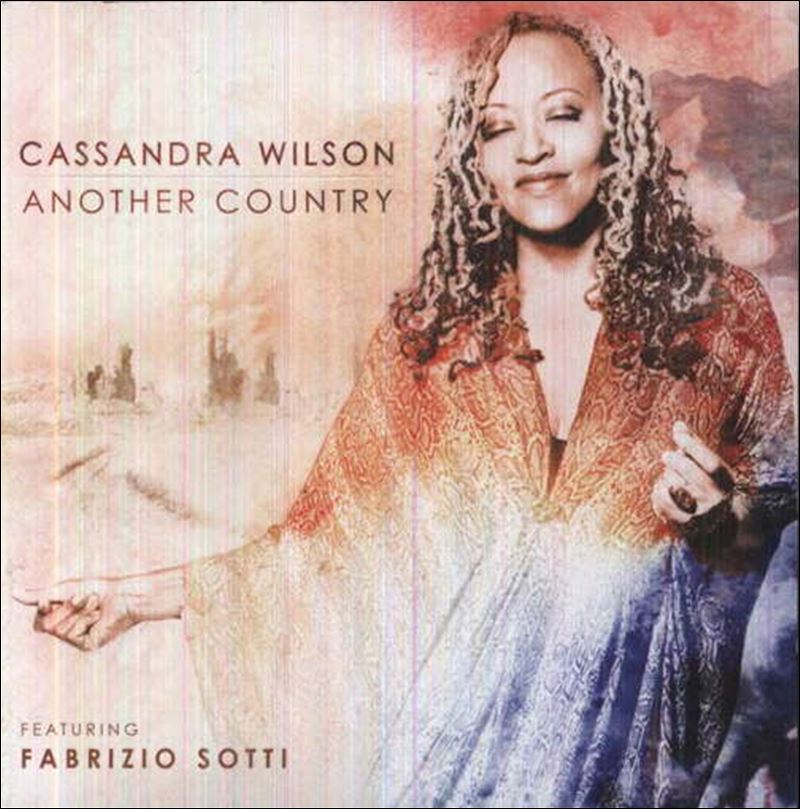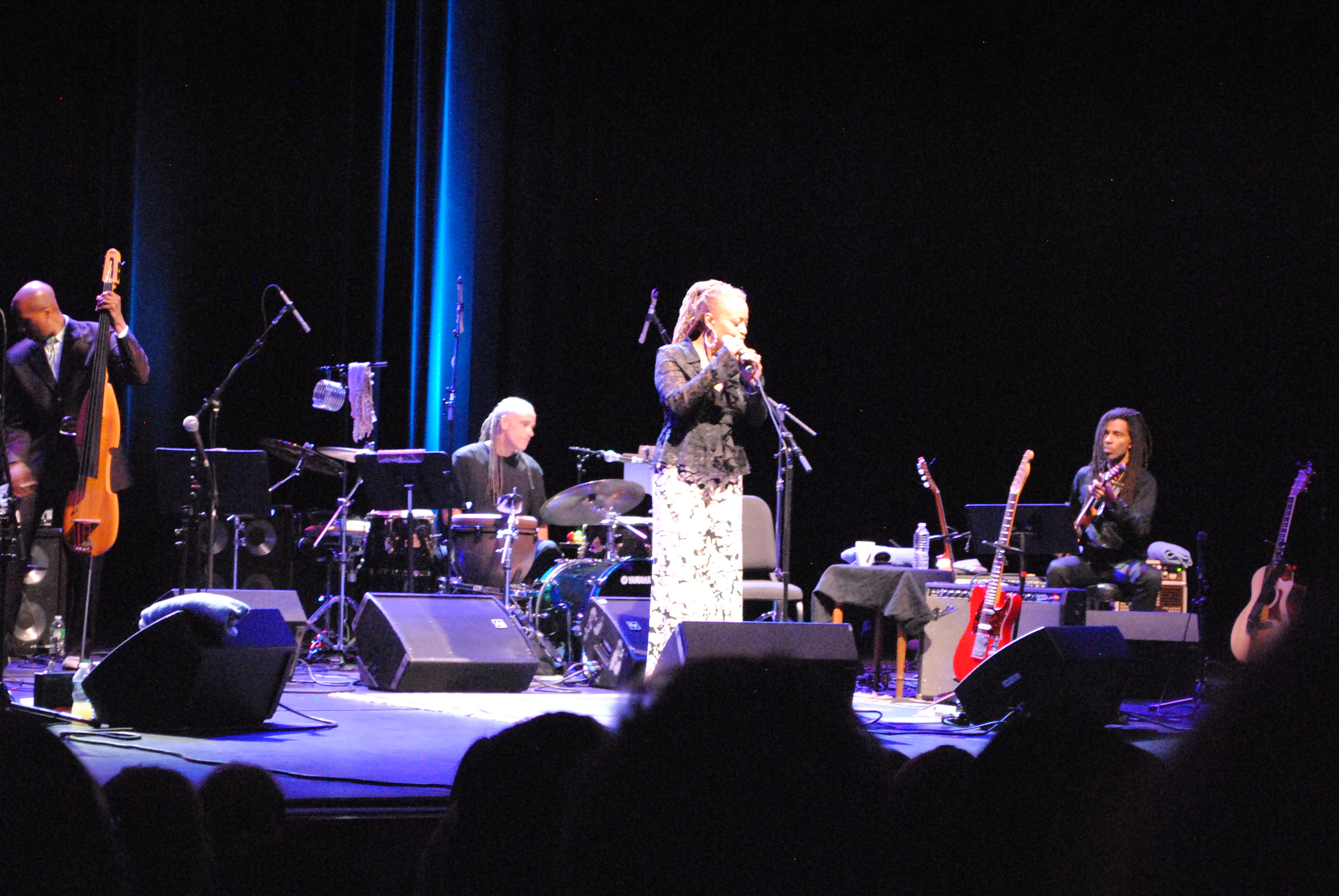
Cassandra Wilson has been touted as one of the finest jazz vocalists of her generation. At the heart of it all she is a Mississippi girl who was raised in Jackson and absorbed some of the area's Delta blues tradition into her soul. Coincidentally, Ms. Wilson was also affected by the contemporary sounds of the folk and rock music of her generation. Like any inspired innovator, she found a way to introduce songs she grew up with into her repertoire. Songs by artists like Van Morrison, Joni Mitchell and even The Monkees, reworking them into minor masterpieces of a hybrid sound that is pure Cassandra Wilson. She possesses a voluptuous contralto voice that she has honed into a marvelously supple instrument. She can alter timbre and tone with precision and purpose. Her relaxed, conversational delivery is more folk/blues than jazz-like, but yet she is an improviser at heart retaining a jazz sensibility in her music. She is a stylist more than a traditional singer, bringing her own unique interpretation to songs that we thought we knew. Sometimes, after hearing her versions, we realize that we really didn't have a clue. For all intents and purposes she defies categorization.
Cassandra Wilson and Band at PAC SUNY
On this the opening evening of the Performing Arts Center at Purchase College's 2013-2014 season, Ms. Wilson was joined by her latest band members. Her musical director, the Swiss chromatic harmonica player Gregoire Maret, the pianist Jon Cowherd, the bassist Lonnie Plaxico, the guitarist Brandon Ross and the French percussionist Mino Cinelu opened the show with a soulful but sweet instrumental.
After the opening warm-up from the band Ms. Wilson walked on the stage to enthusiastic applause. She started the set with a Delta blues inspired song featuring the sparse but effective solo guitar work of Brandon Ross. Ross has the patience and skill to slowly build ever increasingly interesting fragments of a song from what seems, at first, like randomly selected notes. His twangy lines emerge revealing the barest hint of an identifiable rhythm allowing long spaces for bent, scratchy notes to simmer in the air like the smell of cooked greens on a hot stove. You can feel of the blues emanate from the body of his steel guitar as he introduces Charlie Patton's "Saddle up my Pony." Chromatic harmonica player and musical director Gregoire Marmet took up a bass line on a large mouth organ that emanated low register sounds like a reedy old pump organ. Ms Wilson's deliberately paced contralto reading of the lines added the final touches to this blues classic.
The second selection was the title song from her latest CD Another Country. The song has a swaying rhythm that is provided by finger picking by Ross, a walking bass line by Plaxico, some hand percussion by Cinelu and some harmonica accents by Marmet. Mr. Marmet is an accomplished chromatic player who has a sweet sound that lacks the growl of a real blues player-more Toots than Stevie. Ms. Wilson's husky voice easily modulates in a cadence that mimics the song's rhythmic sway.
Twenty years ago Ms. Wilson released her first Blue Note album titled Blue Light Till Dawn, so appropriately she played Van Morrison's "Tupelo Honey" from that CD. In many ways Ms. Wilson's languid delivery takes all the yearning sentiment out of the Irishman's originally touching version. The re-working, while certainly her own interpretation, is just a bit too listless, devoid of the earnest soulful energy that Mr. Morrison so deftly gave to the original. Mr. Marmet's sickeningly sweet harmonica only accentuates the divide relegating the song into schmaltz, Mr. Plaxico's buzzing arco bass at the coda a bit gimmicky.
Ms. Wilson's willingness to cross artificially created musical boundaries is part of her appeal. It may not always be a successful endeavor but she certainly has the fortitude to try to expand her musical palette. Mr. Cowherd and Mr. Plaxico started the next song "Angola" with an ostinato piano/bass line with a distinctive samba-like rhythm that seemed to energize Mr. Cinelu on hand drums. Ms. Wilson clapped her hands and slithered around the stage to the beat as she sang in Portuguese. When Mr. Cinelu harmonized with her voice it was quite pleasing. Ms. Wilson took a cabasa out of Cinelu's hands and the two had the audience clapping in time. Mr. Cinelu exhibited an animated exuberance that grew in intensity as the rhythm section of Plaxico, Ross and Cowherd pushed the pace. Mr. Cinelu exhibited a poly rhythmic finale that had the audience cheering.
In a demonstration of where Ms. Wilson's re-workings of a song are most effective, the most poignant part of the evening was when Ms. Wilson and Mr. Ross played the Jimmy Webb classic "Witchita Lineman" from her album Belly of the Sun. Here Ms. Wilson's purposefully slow and deliberate take accentuated the poignancy of Webb's simple lyrics to perfection. The hushed audience was mesmerized and Mr. Marret's saccharine sound was able to punctuate the mood to perfection.
In speaking about her musical upbringing in a recent NPR interview Ms. Wilson said "I still love the piano, but the guitar is my heart." On "Red Guitar," from her latest CD Another Country, Ms.Wilson picked up a red telecaster-like electric guitar and sang. There is little need for her to play with such an able guitarist as Mr. Ross doing all the heavy lifting here, but it is a homecoming of sorts for Ms. Wilson. It was her early folk/rock/blues playing in coffee houses and such, often self-accompanied on guitar, where she learned to nuances of her voice and formed the essence of her style, so it was nice to here her return to this less produced format. The audience agreed.
Mr. Cowherd's sensitive side was heard on an unnamed instrumental duet between him and Mr. Maret. Mr. Cowherd can play beautifully and his unassuming demeanor belies his talent. Mr. Maret seemed to thrive in the pairing, not over playing, simply adding sparse contrapuntal accents that matched Mr. Cowherd's chords perfectly.
Ms. Wilson's successful integration of pop songs into her vernacular is probably best demonstrated by her re imagining of The Monkee's hit "The Last Train to Clarksville," which she first covered on her Grammy award-winning album New Moon Daughter from 1996. On this version she proved that she can continue to make otherwise generic songs into her own minor masterpieces. Mr. Cowherd was particularly soulful on this one and Mr. Plaxico was rock steady throughout. She left the stage as Mr. Maret and the band took the song out.
After a standing ovation Ms. Wilson returned to the stage and appropriately ended the set with a blues. Mr. Ross, who never left the stage-tuning his guitar throughout the applause, led off with his pungent guitar lines that slowly but surely develop into a four bar blues line. The band builds this slow-cooker in stages as each instrument enters adding more fuel to this simmering fire. Ms. Wilson's smoky alto is center stage as she walks us through the Son House lyrics of "Death House." Ms. Wilson first did this song on her New Moon Daughter Album and it is the authentic pathos of her singing on this song that firmly establishes her as a true blues artist of major import. On this evening however, after a few verses of Ms. Wilson's heart wrenching vocals, (which we could have used more of), the band took the song as a vehicle for extended improvisation by Mr. Maret. Despite the crowd's applause during Mr. Maret's endless solo, as a harmonica player myself, I am particularly sensitive to the effectiveness of a harp in music and especially within the blues idiom. For me, Mr. Maret's indulgence detracted from the performance. I would have preferred few choruses with a bending diatonic harp for this song in keeping with the blues tradition, but that is just a personal preference. More importantly, as musical director, Mr. Maret, no matter how talented a player, must realize and that using the harmonica sparingly is the most prudent course. On this point perhaps Mr. Ross, whose judicious use of space on his guitar is exemplary, could be his guide. Ms. Wilson's voice is the feature here and she did not disappoint, but despite a generally pleasing performance, it was a bit disappointing that Ms.Wilsons' voice was not highlighted more and that the band, however good, was more in the background.
The Performing Arts Center at Purchase College has a fabulously eclectic season planned for this year. Its schedule can be found at here.

